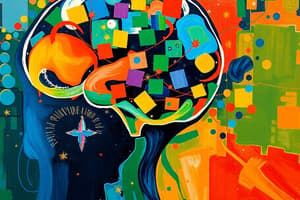Podcast
Questions and Answers
What is the main difference between acute stress and chronic stress?
What is the main difference between acute stress and chronic stress?
- Acute stress is short-term, while chronic stress is ongoing. (correct)
- Acute stress is caused by work demands, while chronic stress is caused by family dynamics.
- Acute stress has no lasting effects, while chronic stress always leads to long-term harm.
- Acute stress is related to life transitions, while chronic stress is not.
Which of the following is NOT a common cause of stress as mentioned in the text?
Which of the following is NOT a common cause of stress as mentioned in the text?
- Family dynamics
- Work demands
- Outdoor activities (correct)
- Financial hardship
How does the text define stress?
How does the text define stress?
- A state of physical tiredness
- A feeling of happiness and excitement
- A state where the body perceives a demand exceeding its coping capacity (correct)
- A situation where one feels calm and relaxed
Which type of stress results from ongoing sources like financial difficulties or relationship issues?
Which type of stress results from ongoing sources like financial difficulties or relationship issues?
What triggers acute stress according to the text?
What triggers acute stress according to the text?
Which of the following is a physical consequence of chronic stress?
Which of the following is a physical consequence of chronic stress?
What role does mindfulness meditation play in stress management?
What role does mindfulness meditation play in stress management?
How can time management skills help in stress reduction?
How can time management skills help in stress reduction?
What effect can chronic stress have on mental health?
What effect can chronic stress have on mental health?
Why is establishing healthy sleep habits important in managing stress?
Why is establishing healthy sleep habits important in managing stress?
Flashcards are hidden until you start studying
Study Notes
Understanding Stress through Psychological Lenses
Stress is a familiar concept, often associated with feelings of anxiety and unease. But what role does psychology play in helping us understand this complex phenomenon? In exploring stress from psychological perspectives, we'll delve into its nature, causes, effects, and coping strategies.
Defining Stress
While it may seem intuitive, defining stress can be somewhat challenging because it encompasses both physiological reactions (our 'fight or flight response') and emotional experiences. We typically refer to stress when our body perceives a demand exceeding its capacity to cope — think deadlines, conflict, illness, or environmental factors like noise pollution.
Types of Stressors
There are two main types of stressors: acute stress and chronic stress. Acute stress results from short-term pressures, such as exams or presentations; once resolved, acute stress usually subsides without causing lasting harm. Chronic stress originates from ongoing sources, like financial difficulties or relationship issues—it poses more significant risks to health and wellbeing over time.
Common Causes
Various circumstances contribute to stress, including work demands, family dynamics, school responsibilities, and financial hardship. Life transitions, such as graduating college, becoming a parent, losing a loved one, or moving to another city, also increase vulnerability to stress.
Impacts on Wellbeing
In moderate amounts, stress can promote productivity by providing motivation and challenge. However, excessive or prolonged exposure to stress has detrimental consequences that affect physical, mental, and social health. On the physical front, chronic stress increases susceptibility to disease and exacerbates conditions like hypertension, migraines, diabetes, asthma, and cardiovascular disorders. From a mental perspective, stress contributes to depression, anxiety disorders, substance abuse, eating disorders, and burnout. Moreover, stress affects relationships, leading to communication breakdowns and strained connections within families, friendships, and romantic partnerships.
Coping Strategies
Given these challenges, managing stress becomes crucial for maintaining good health and quality of life. Here are some evidence-based ways to mitigate stress:
- Mindfulness meditation: A practice involving nonjudgmental awareness of thoughts, emotions, and bodily sensations, reducing rumination and promoting relaxation.
- Physical exercise: Regular activity stimulates brain function, enhances mood, improves sleep, and promotes overall fitness.
- Sleep hygiene: Establishing healthy habits around bedtime, creating a relaxing environment in your bedroom, avoiding screens before sleeping, and ensuring adequate rest.
- Time management skills: Prioritizing tasks, setting realistic goals, delegating duties, and utilizing tools like calendars and planners.
- Relaxation techniques: Engaging in practices like deep breathing exercises, progressive muscle relaxation, guided imagery, and yoga.
- Emotional support: Connecting with friends and family members who offer empathy and encouragement during difficult times.
- Professional help: Seeking therapy or counseling services from licensed professionals.
- Healthy lifestyle choices: Eating nutrient-rich foods, limiting alcohol intake, and minimizing caffeine consumption.
As psychologists continue to explore intricate patterns linking stress with human behavior, they equip individuals and communities with effective strategies to confront adversity and realize optimal wellness.
Studying That Suits You
Use AI to generate personalized quizzes and flashcards to suit your learning preferences.




